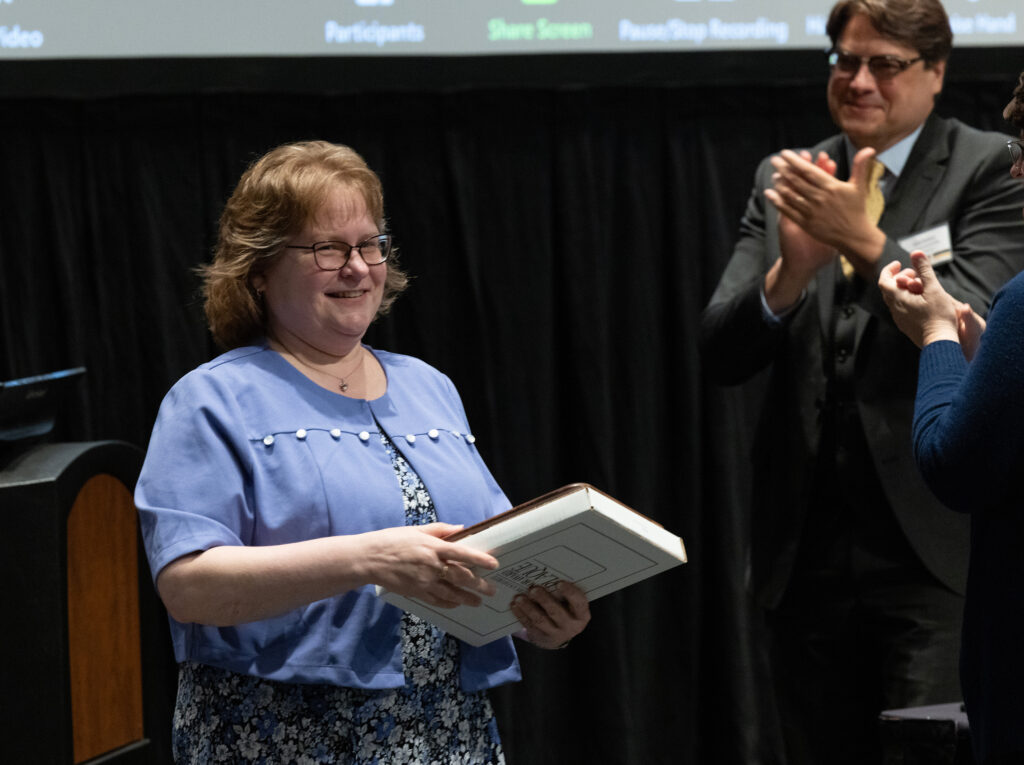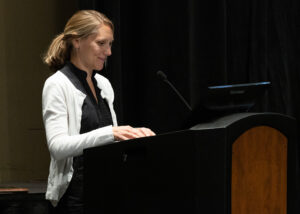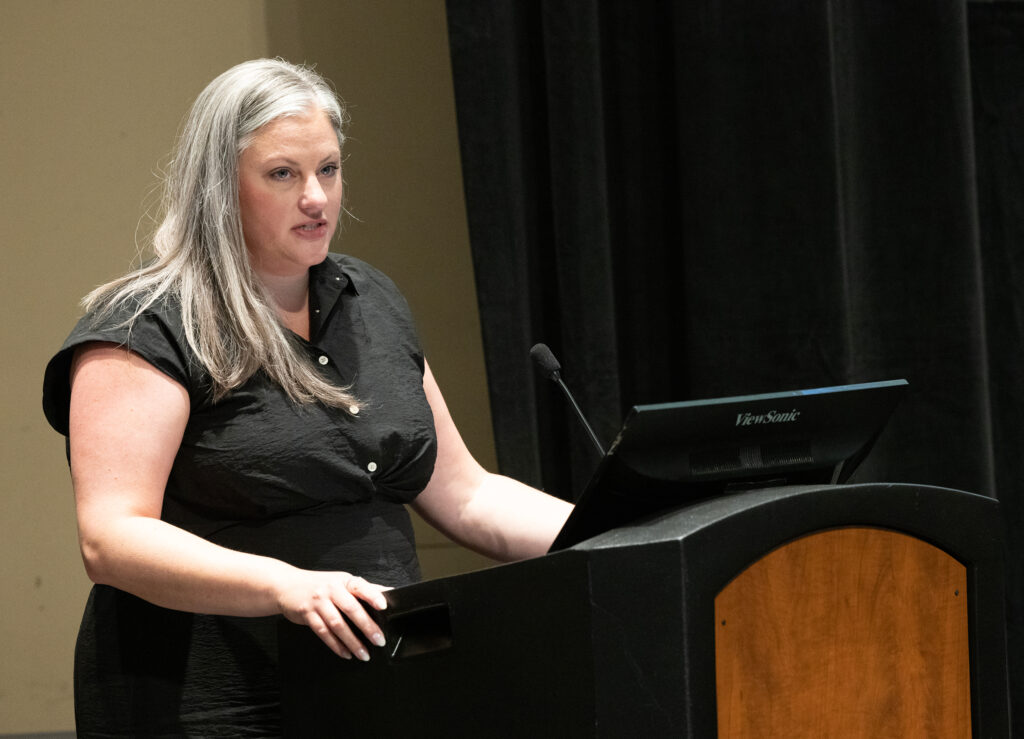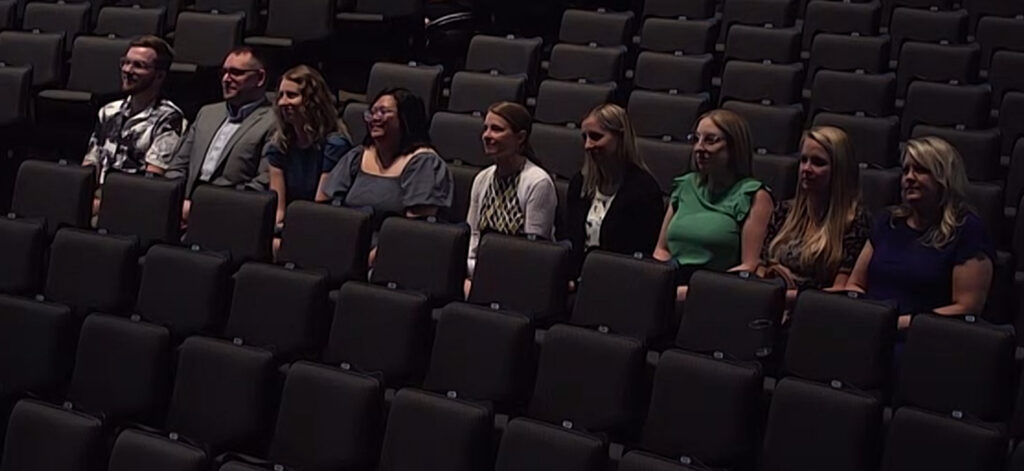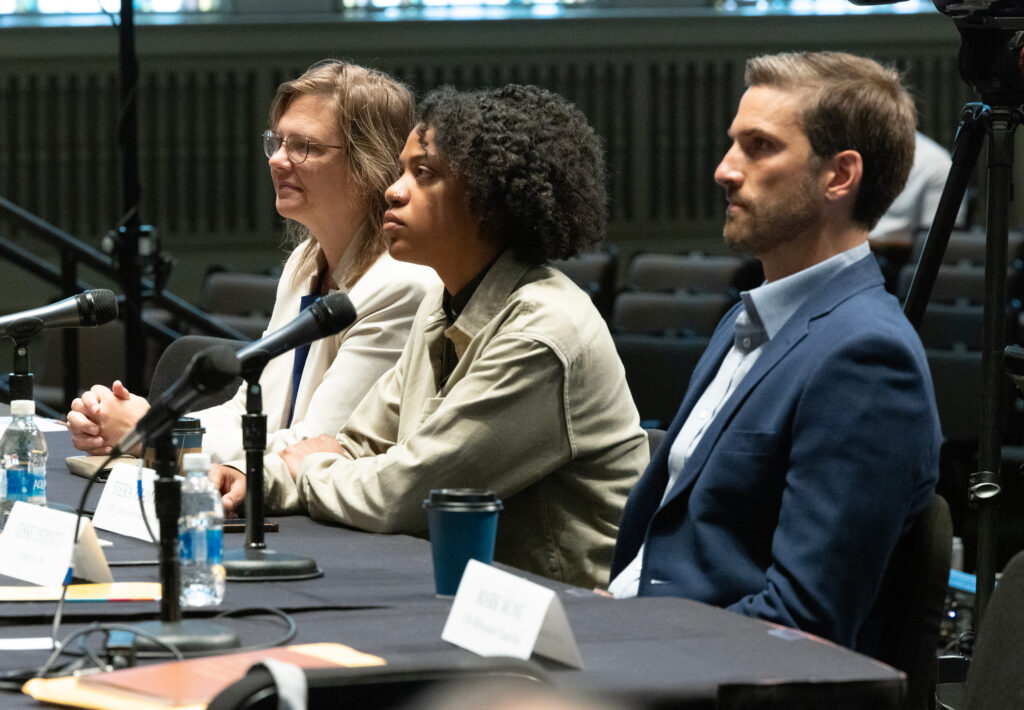MILWAUKEE – The University of Wisconsin System Board of Regents today honored this year’s recipients of the Academic Staff Excellence Awards. These awards recognize exceptional service to the university and are the UW System’s highest recognition bestowed on members of its academic staff.
Award recipients are selected for superior performance resulting in significant contributions to the department and institution; use of positive personal interaction to manage work changes; and a consistently creative approach that improves productivity and work quality.
“This year’s outstanding award recipients reflect the breadth of initiatives conducted by our academic staff across the UW System,” said Regent John W. Miller, chair of the selection committee. “Our honorees are committed to creating vital education programs to support student success, and the results are impressive.”
The 2023 recipients include two individuals and one program:
-
Kathleen Hunzer, Director, Chancellor’s Scholars, Honors Program, and Falcon Scholars, UW-River Falls
“We’re here for students, for student success, for student learning, for student growth,” said Dr. Kathleen Hunzer, addressing drivers for many academic staff members. “We also create a sense of belonging and community because that’s what leads to student success, knowing that someone is watching out for you and has your back.
“We’re also both leaders and worker bees,” she added. “In good times we thrive, in bad times we don’t give up. We get things done.”
Hunzer, who has served UW-River Falls for two decades, reimagined the university’s Honors Program to better serve students. Over the past decade, it has grown from 65 participants to more than 600 active students.
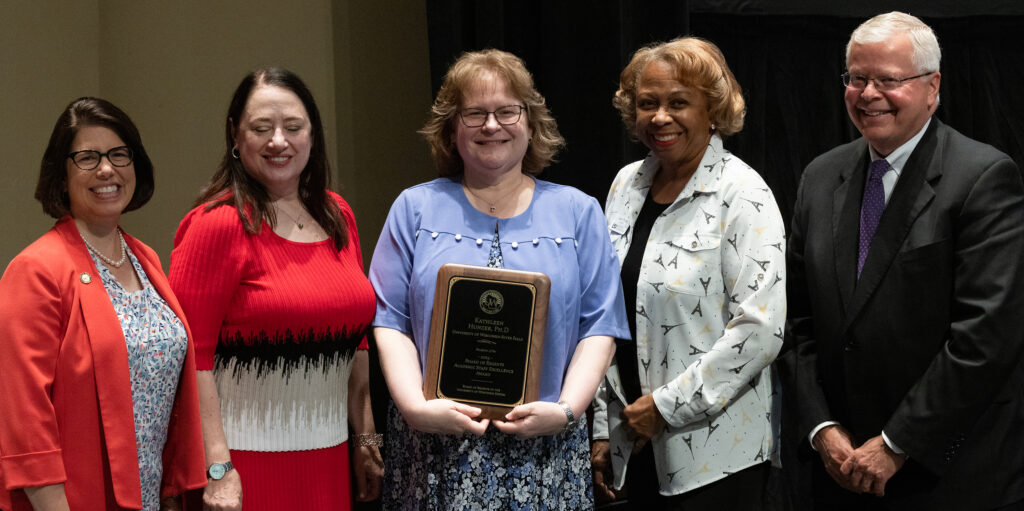
Kathleen Hunzer (holding plaque) receiving Board of Regents 2023 Academic Staff Excellence Award. Also pictured (from left): UW-River Falls Chancellor Maria Gallo, Regent President Karen Walsh, Regent Joan Prince, and UW System President Jay Rothman. (Photo by UWM)
-
Laura Monahan, Museum Associate Director and Curator of Osteology, University of Wisconsin Zoological Museum, Department of Integrative Biology, UW-Madison
Laura Monahan, who served as the de factor director of the museum for 16 years, shared a lesson she learned early on in her career when a young visitor asked her what a newt eats. “I didn’t know,” she said. “And with 750,000 specimens at the museum, I’m never going to know everything.” She said that recognizing that truth highlights the great need to collaborate with others.
Monahan said the museum, which has a very small staff, relies heavily on interns and volunteers. “All have skills and expertise but what motivates each one to participate is different,” she said. “No matter what is on my agenda, I try to take the opportunity to connect with each person at the museum. It’s a team working together.”
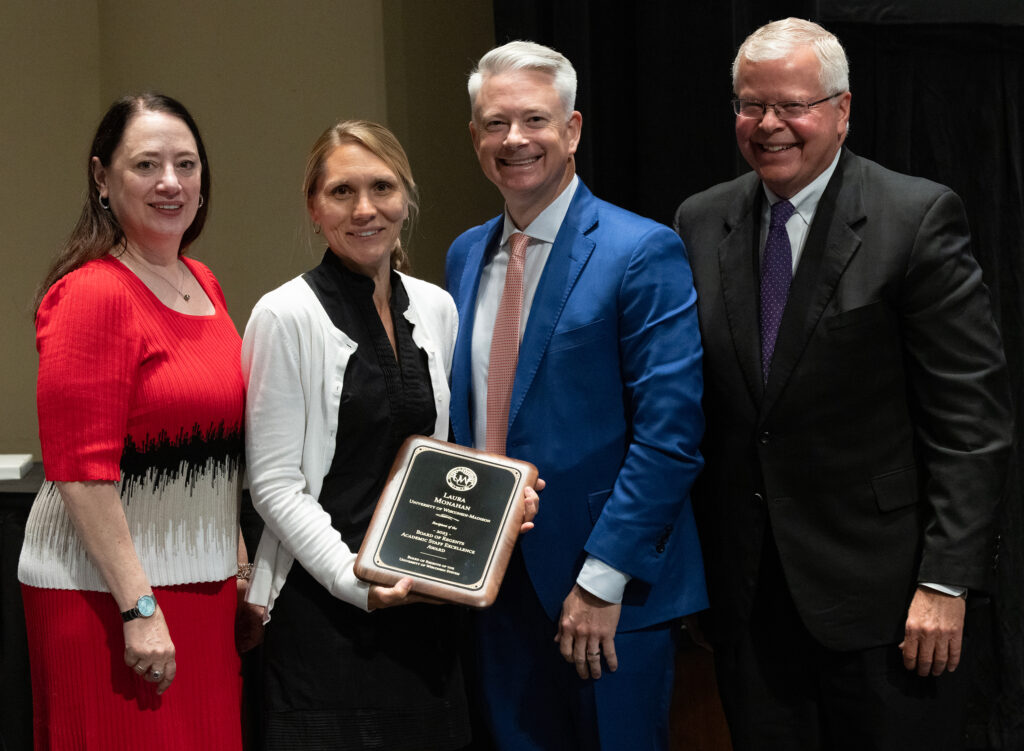
Laura Monahan (holding plaque) receiving Board of Regents 2023 Academic Staff Excellence Award. Also pictured (from left): Regent President Karen Walsh, Regent John Miller, and UW System President Jay Rothman. (Photo by UWM)
-
Early College Programs, UW-Green Bay
“The real magic – or secret sauce, as we like to call it – is the 20 staff members on our team,” said Meagan Strehlow, Associate Vice Chancellor for Student Access and Success. “The Early College Programs team are passionate, student-focused professionals. They’re building pathways to higher education for students who may have thought that college was not for them.”
The Rising Phoenix, Dual Enrollment Services, and GEAR UP Services programs at UW-Green Bay address the opportunity gap in Wisconsin, focusing on providing high-quality, equitable access to higher education for high school students and some middle school students throughout the state.
“The Early College Programs teams are the ones that look challenge in face, scoff, and then figure out the gameplan,” Strehlow said. “This team works to take burden off high school counselors, looking out for the students, pushing and pulling when necessary, with compassion and understanding.”
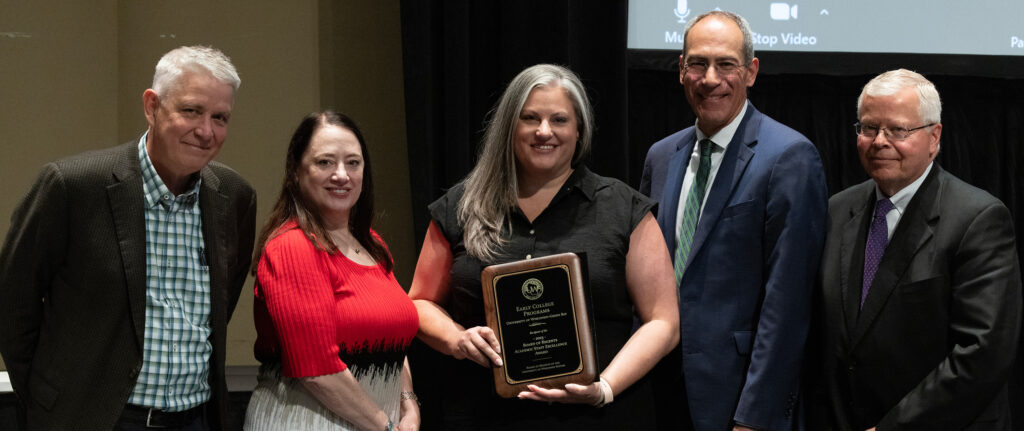
UW-Green Bay’s Early College Programs received the Board of Regents 2023 Academic Staff Excellence Award, accepted by Meagan Strehlow (holding plaque) on behalf of the program. Also pictured (from left): Regent Bob Atwell, Regent President Karen Walsh, UW-Green Bay Chancellor Michael Alexander, and UW System President Jay Rothman. (Photo by UWM)
Video: “Businesses Drive Innovation with UW Universities”
One of the priorities identified in the strategic plan is the need for the UW System to foster a culture of innovation in support of advancing human knowledge and economic prosperity.
“We know that UW System universities provide the talent, research, and support that help Wisconsin companies and entrepreneurs thrive and innovate,” said UW System President Jay Rothman. “Our universities are the incubators, the researchers, and sometimes even the executors of exciting new innovations.”
UW System’s video highlighted how universities are helping businesses at every stage: from student entrepreneurs with just an idea, to businesses building their workforce, or working on developing new technologies.
UWM hosts panel discussion on entrepreneurial programs
UW-Milwaukee Chancellor Mark Mone led a panel discussion highlighting UWM entrepreneurs and emphasizing their impact as part of Milwaukee’s innovation economy. Panelists included UWM alumni and faculty who addressed how UWM undergraduate and graduate programs are leveraging their skills to launch new enterprises in Milwaukee and scale entrepreneurial programming as well as the process of bringing research from an R1 institution into the market.
Jess DePinto, co-founder and CEO of Frontdesk, Inc., a travel technology company, said the majority of their senior leaders came out of UWM. “My story would not have been where it is now without the UW System,” said DePinto, who earned an engineering degree at Milwaukee.
DePinto said his entrepreneurial journey started with a start-up challenge. “What’s important is the failing upward,” he said. “When you’re pushed out of your comfort zone, that’s when you grow.”
Carol Hirschmugl, a former faculty member at UWM and now the founder and CEO of COnovate, Inc., a company developing new materials for lithium ion batteries, said her success started with a discovery that led to a patent done through UWM’s research foundation. “I had tremendous support on my journey,” she said.
Hirschmugl noted that the company continues to use facilities on campus for some of its analysis and maintaining connections is “a great way to attract people to come to us.”
“It wasn’t until I participated in a start-up challenge (on campus) that I realized failures aren’t the end of the world,” said Tiera Trammell, program manager for UWM’s Lubar Entrepreneurship Center and a UWM alumna. She said failure teaches people to pivot and “think about ideas in different ways, where to take the idea now to continue.”
Trammell said the Lubar Center is focused on enhancing relationships with organizations and businesses in the community. “We want to make sure students have a pathway into the community and don’t just leave when they graduate,” she said.
Election of Board officers
The Board of Regents unanimously re-elected Regent President Karen Walsh and Regent Vice President Amy Blumenfeld Bogost to second one-year term.
“As Regent Beightol said yesterday, this board is a shining example of non-partisan work,” Walsh said. “We have much work to do and I can’t think of a better group of people to carry it out.”
Walsh has served on the Board since May 2019, and is director of the BerbeeWalsh Foundation, a family foundation dedicated to human and animal health and welfare. She holds bachelor’s and master’s degrees in journalism from UW-Madison, and over two decades served in a variety of public information and communications positions at the university.
“I’m still in awe of the privilege of being appointed to this Board,” said Bogost, now in her third year as a Regent. “I learn so much from each and every one of you.”
Bogost is a practicing attorney in Madison, with a focus on representing victims of sensitive crimes and Federal Title IX. She is also closely involved with the National Trial Tribal College, co-sponsored by and located at the UW Law School. She earned a law degree from Chicago Kent College of Law and a bachelor’s degree in Political Science and History from UW-Madison.
- See the UW System news release: UW System Regents re-elect Karen Walsh as President, Amy Blumenfeld Bogost as Vice President
Also elected to the Board were: Megan Wasley, Corporate Secretary of the Board; Christen Bock, Assistant Secretary; Steven Wright, Assistant Secretary; Sean Nelson, Trust Officer; and Charles Saunders, Assistant Trust Officer.
In other business, the Regents:
- Approved a resolution of appreciation for UW-Milwaukee hosting the June 2023 meeting;
- Approved the Annual Request for Funding from the Vilas Trust Fund for UW-Madison and UW-Milwaukee;
- Approved UW-Eau Claire’s request for a Master of Public Health in Public Health;
- Approved UW-Madison’s request for a Master of Science in Business: Accounting and Business Analysis;
- Approved UW-Madison’s request for a Master of Business Administration in Business: Executive;
- Approved UW-Madison’s request for a Bachelor of Science in Animal and Veterinary Biosciences;
- Approved UW-Milwaukee’s request for a Master of Science in Rehabilitation Science and Technology;
- Approved UW-Stout’s request for a Bachelor of Science in Automation Leadership;
- Approved the 2023 Report on Faculty Promotions, Tenure Designations, and Other Changes of Status;
- Approved a five-year, $11.6 million extension of UW System’s agreement with EAB Global for its Navigate system of services and software that provides analytics, student success coordination and communication management;
- Approved UW-Milwaukee’s agreement that extends its participation in the Northwestern Mutual Data Science Institute for an additional five years, following its establishment in 2018. With partners including Northwestern Mutual and Marquette University, the goal of the Institute is to build a regional technology ecosystem through research, business, and talent development;
- Approved UW-Milwaukee’s agreement with Guild Education, a public benefit company that works with an exclusive network of employers that offer education benefits, allowing UWM to engage those learners to provide an array of degree and certificate programs;
- Approved an addition to the UW System strategic plan for major IT projects, which enables UW-Madison to proceed with Phase 2 of its “Campus Access Controls Replacement” project;
- Approved UW-Madison’s request for a $10 increase in its undergraduate application fee from its current level of $60. The new $70 fee would be effective for the 2023-24 application cycle;
- Approved reductions at UW-Madison and at UW Oshkosh to the 2023-24 segregated fee rates approved by the Board in March;
- Approved three-year extensions of the dining services contracts between Compass Group USA and UW-La Crosse, UW-River Falls, and UW-Superior;
- Approved UW-Madison’s request for authority to accept ownership of two greenhouses and a headhouse constructed by the United States Department of Agriculture (USDA) at the Arlington Research Station (ARS). Between 1968 and 1977, the USDA constructed two greenhouses and one headhouse at the ARS, one of more than 10 research stations managed by the university situated across the state. USDA researchers work alongside UW-Madison investigators on various research projects. A lease between with the USDA will be created to better track and allocate operations and maintenance expenses of the facility to the USDA;
- Approved UW-Madison’s request for authority to enter into a lease of approximately 7,679 square feet located in Fitchburg for the College of Engineering. The lab and office space are needed to support the transformative technology of self-driving vehicles, also known as Connected and Autonomous Vehicles (CAV) research. The CAV research at the College of Engineering is focused on two programs that currently have annual research expenditures that exceed $3 million;
- Approved UW System’s request for authority to amend Regent Policy Document (RPD) 13-2, “Real Property Contracts: Signature Authority and Approval,” to align with 36.11(1)(b), Wis. Stats. that specifies all purchases of real property shall be subject to the approval of the building commission. The proposed policy also permits chancellors to further delegate contract signature authority to an institution’s chief business officer to sign leases of real property to be occupied by the Board or to sign documents accepting gifts, grants, and bequests of real property within approved campus boundaries;
- Approved UW System’s request for authority to amend Regent Policy Document (RPD) 19-15, “Physical Development Principles,” to modify policy provisions related to sustainable design and the stewardship of energy and other sustainable systems;
- Heard a status report from UW System on leasing activity from December 1, 2022 through May 31, 2023. Three leases for new space were executed and commenced and 19 leases were either amended, renewed, or terminated in the last six months;
- Heard a status report from UW System on the UW Managed capital projects from December 1, 2022 through June 1, 2023. The total value of the projects that are or have been part of the program has increased from $529,671,234 in December 2022 to $614,290,868. In addition to the program growing, the pace is increasing with 28 anticipated General Prime Contractor (GPC) bid openings in 2023. Program statistics include:
- 54 active projects valued at $453.2 million;
- 29 projects ($64.7 million) completed and working on close-out activities;
- 11 active study projects ($4 million);
- 43 active projects including both design and construction ($449.2 million);
- Approved the Fiscal Year 2024 Annual Plan for the Office of Compliance and Risk Management; and
- Approved UW System’s internal audit plan for Fiscal Year 2024.
See June 8 (day 1) news summary
The next meeting of the University of Wisconsin System Board of Regents will be July 6-7, 2023, at UW-La Crosse.

